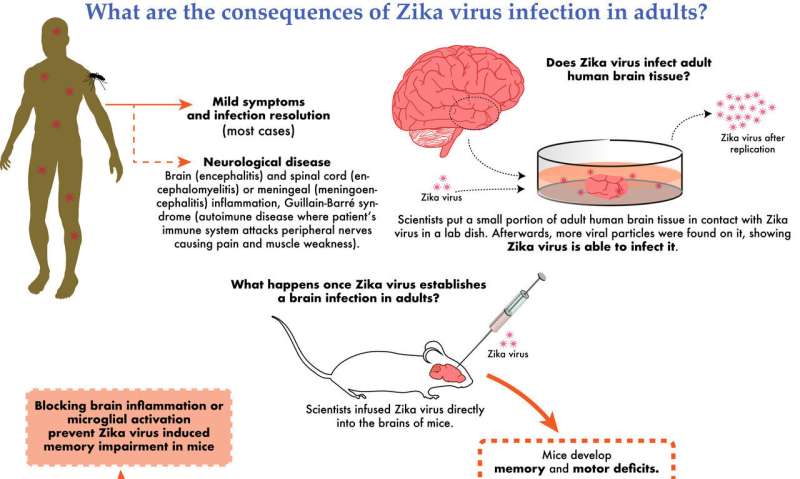Zika virus infects the adult human brain and causes memory deficits in animal models

Zika virus attracted worldwide attention in recent years due to the devastating consequences of infection for pregnant women and their fetuses, many of which were born with microcephaly and other severe neurological malformations. Although ZIKV infection has historically been associated with relatively mild symptoms, a number of serious neurological complications were described in adult patients during the 2015 outbreak in America. Despite these clinical observations, why ZIKV is toxic to the adult brain and how neurological problems are caused in infected adults have remained unknown.
Researchers led by neuroscientists Sergio T. Ferreira e Claudia Figueiredo and virologist Andrea Da Poian at the Federal University of Rio de Janeiro (Brazil) have now come up with answers to these questions. First, they exposed small fragments of adult human brain tissue to ZIKV isolated from the blood of an infected Brazilian patient. Contrary to the previous belief that ZIKV only infects neuronal progenitor cells or neurons that are still immature in the developing brain, they found that the virus infected and replicated in adult human tissue, producing new viral particles capable of infecting more cells.
But what are the consequences of this infection? To address this question, they injected Zika virus directly into the brains of mice. As lead author Claudia P. Figueiredo explains, "Infected mice exhibited marked memory impairment that persisted even after infection had been fought off by the organism. Moreover, this was consistent with the fact that brain regions responsible for learning and memory processing were the main sites of viral replication in their brains."
The work further showed that infection by ZIKV causes a strong inflammatory response in the mouse brain, and this includes activation of brain resident immune cells called microglia. Fernanda Barros-Aragão, a Ph.D. student and co-author of the study, explains that this exaggerated inflammatory response is ultimately responsible for memory loss: "Neurons communicate through highly specialized regions called synapses. Surprisingly, we found that microglia that become aberrantly activated upon infection by ZIKV attack and engulf synapses. This impairs communication between neurons, and therefore, the formation of new memories." Interestingly, when animals were treated for about one week with anti-inflammatory drugs capable of blocking microglial activation, they recovered memory.
Results from this study indicate that the adult brain is damaged by infection by ZIKV, and point to the need to evaluate learning and memory performance in follow-up assessments of infected adults. Although no specific treatments for ZIKV infection are yet available, these findings further reveal the possibility that neurological symptoms caused to infection by controlling brain inflammation.
The paper, titled "Zika virus replicates in adult human brain tissue and impairs synapse function and memory in adult mice," will be published in Nature Communications on the 5th of September.




















